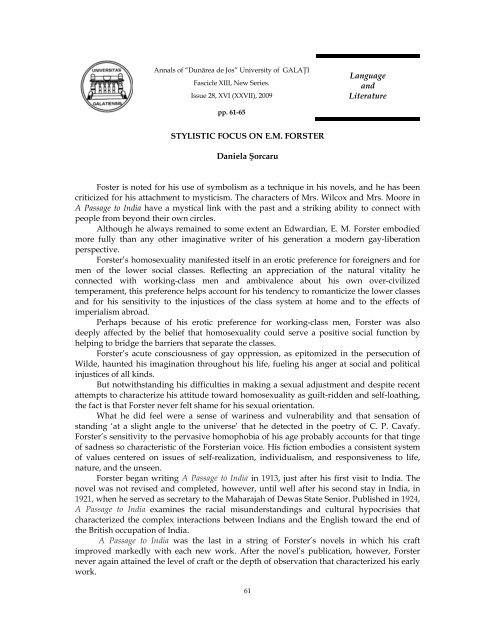You also want an ePaper? Increase the reach of your titles
YUMPU automatically turns print PDFs into web optimized ePapers that Google loves.
Annals of “Dunărea <strong>de</strong> <strong>Jos</strong>” University of GALAŢI<br />
Fascicle XIII, New Series.<br />
Issue 28, XVI (XXVII), 2009<br />
pp. 61-65<br />
STYLISTIC FOCUS ON E.M. FORSTER<br />
Daniela Şorcaru<br />
61<br />
Language<br />
and<br />
Literature<br />
Foster is noted for his use of symbolism as a technique in his novels, and he has been<br />
criticized for his attachment to mysticism. The characters of Mrs. Wilcox and Mrs. Moore in<br />
A Passage to India have a mystical link with the past and a striking ability to connect with<br />
people from beyond their own circles.<br />
Although he always remained to some extent an Edwardian, E. M. Forster embodied<br />
more <strong>full</strong>y than any other imaginative writer of his generation a mo<strong>de</strong>rn gay-liberation<br />
perspective.<br />
Forster’s homosexuality manifested itself in an erotic preference for foreigners and for<br />
men of the lower social classes. Reflecting an appreciation of the natural vitality he<br />
connected with working-class men and ambivalence about his own over-civilized<br />
temperament, this preference helps account for his ten<strong>de</strong>ncy to romanticize the lower classes<br />
and for his sensitivity to the injustices of the class system at home and to the effects of<br />
imperialism abroad.<br />
Perhaps because of his erotic preference for working-class men, Forster was also<br />
<strong>de</strong>eply affected by the belief that homosexuality could serve a positive social function by<br />
helping to bridge the barriers that separate the classes.<br />
Forster’s acute consciousness of gay oppression, as epitomized in the persecution of<br />
Wil<strong>de</strong>, haunted his imagination throughout his life, fueling his anger at social and political<br />
injustices of all kinds.<br />
But notwithstanding his difficulties in making a sexual adjustment and <strong>de</strong>spite recent<br />
attempts to characterize his attitu<strong>de</strong> toward homosexuality as guilt-rid<strong>de</strong>n and self-loathing,<br />
the fact is that Forster never felt shame for his sexual orientation.<br />
What he did feel were a sense of wariness and vulnerability and that sensation of<br />
standing ‘at a slight angle to the universe’ that he <strong>de</strong>tected in the poetry of C. P. Cavafy.<br />
Forster’s sensitivity to the pervasive homophobia of his age probably accounts for that tinge<br />
of sadness so characteristic of the Forsterian voice. His fiction embodies a consistent system<br />
of values centered on issues of self-realization, individualism, and responsiveness to life,<br />
nature, and the unseen.<br />
Forster began writing A Passage to India in 1913, just after his first visit to India. The<br />
novel was not revised and completed, however, until well after his second stay in India, in<br />
1921, when he served as secretary to the Maharajah of Dewas State Senior. Published in 1924,<br />
A Passage to India examines the racial misun<strong>de</strong>rstandings and cultural hypocrisies that<br />
characterized the complex interactions between Indians and the English toward the end of<br />
the British occupation of India.<br />
A Passage to India was the last in a string of Forster’s novels in which his craft<br />
improved markedly with each new work. After the novel’s publication, however, Forster<br />
never again attained the level of craft or the <strong>de</strong>pth of observation that characterized his early<br />
work.












